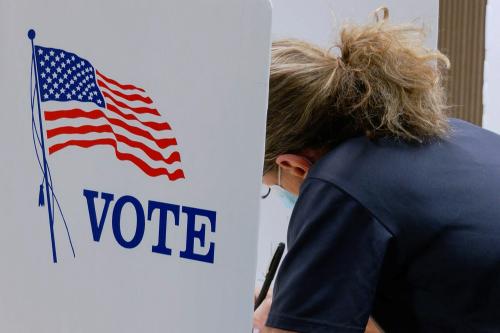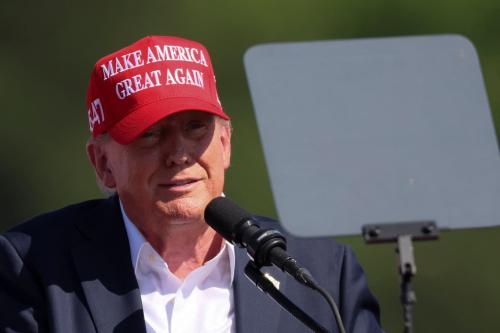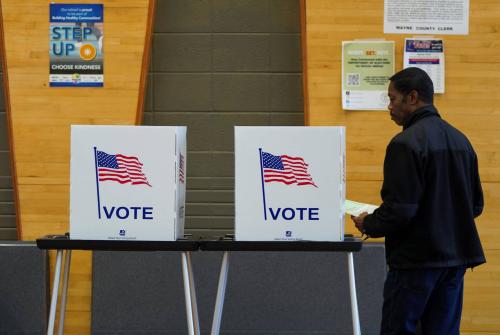As we approach President Biden’s 2024 State of the Union speech, experts from the Governance Studies program at the Brookings Institution share their thoughts on the issues and policy ideas Biden should address during this year’s speech.
William A. Galston
President Joe Biden, who begins his campaign for reelection well behind former President Donald Trump, needs a well-crafted State of the Union address, clearly enunciated and forcefully delivered, to invigorate his base and expand his appeal. The speech must include, at a minimum, a defense of his record, compelling proposals for a second term, and a clear statement of what is at stake in the 2024 election.
As in most sports, a successful strategy combines a strong offense with a strong defense. President Biden knows that high prices, a crisis at the southern border, and foreign wars that could spin out of control are threats not only to the national interest but also to his reelection prospects. He must explain to the American people how he plans to address these problems. And he should reach out to a portion of the electorate—voters with less than a four-year college degree—whose movement away from the Democrats has accelerated as Trump has cemented his control over the Republican Party.
At the same time, Biden must sharpen the people’s understanding of his opponent’s weaknesses in areas such as abortion, personal character, and commitment to constitutional standards and democratic norms. He should remind his viewers of Mr. Trump’s excesses during his first term, such as family separation as a tool of immigration enforcement. And he should use his opponent’s own words to paint a vivid portrait of what his second term would mean—mass deportations, the deployment of the military to suppress domestic unrest, and further restrictions on access to abortion and even contraception.
Although foreign policy is rarely decisive in national elections, President Biden is passionately devoted to the defense of democracy against autocracy around the world, to alliances as a key element of this defense, and to Ukraine as the most urgent example of the struggle. He should show his passion on these issues; people respect leaders with genuine convictions. And he should underscore the costs—to the United States and democracy as well as to our allies—of a more isolationist approach.
Jon Valant
I’d like to see President Biden express dismay that we’ve allowed U.S. public schools to become a battleground for today’s culture wars—and to assert that he and his party will protect and strengthen our public education system. Democrats have been conspicuously quiet about K-12 education since getting blamed for being too slow to reopen schools after the COVID-19 outbreak. In that silence, new voices, such as Moms for Liberty, have emerged to call for extreme measures like book bans, the elimination of social-emotional learning programs, and defunding public education in favor of private school choice programs. Most of those ideas aren’t popular, even among Republicans, and they don’t address the (very real) challenges facing schools today. President Biden should affirm that public schools are core U.S. institutions that we need to cherish, and he should communicate that Democrats will protect the vulnerable students who tend to be victims when adults’ politics infiltrate children’s classrooms. Ironically, the best message that President Biden can send on education might be a fundamentally conservative one. It’s that Democrats will be the party that ensures that schools can focus on the basics—helping students develop academically and socially—rather than getting distracted by a political sideshow.
Chinasa T. Okolo
As part of the upcoming State of the Union, I anticipate hearing comments on the United States’ efforts to advance progress in comprehensive data privacy regulation. Along with the recent Executive Order to Protect Americans’ Sensitive Personal Data, which focuses on protecting Americans’ sensitive information from being exploited by “countries of concern,” President Biden should address what efforts are being made to prevent data exploitation by other countries, particularly domestic ones.
Data privacy has become even more crucial, given the nuances introduced by the development and usage of generative AI. However, the United States has not progressed much in this domain. According to the International Association of Privacy Professionals, only 13 states (California, Colorado, Connecticut, Delaware, Indiana, Iowa, Montana, New Jersey, Oregon, Tennessee, Texas, Utah, and Virginia) have passed comprehensive data privacy regulations. This lack of consistent data privacy regulation still leaves a significant percentage of the American population vulnerable to data exploitation, and it will be imperative to work toward developing and implementing comprehensive data privacy regulation as the U.S. advances efforts to regulate AI.
I also anticipate updates on AI regulation progress. Last year’s Executive Order on AI introduced a number of standards to protect Americans from the harms of AI systems; however, there is still an unclear timeline as to when AI regulation will be introduced. President Biden should also address AI and its respective impact on inflation, the top concern of Americans, according to the Pew Research Center.
Companies are making record profits and steadily raising prices, harming vulnerable Americans, and contributing further to inflation. AI has the potential to exacerbate this exploitation (and may already be doing so). While Wendy’s restaurants’ plans to implement dynamic pricing received major backlash over the past week, airline and ridesharing companies have used this practice for years and are increasingly using AI to develop more robust pricing algorithms. The FTC has already begun to address the use of algorithms in rental price-fixing, but further protections are needed across a broader range of consumer goods and services.
E.J. Dionne, Jr.
State of the Union addresses are always a high-wire act between politics and policy. That’s especially true this year. Thursday’s speech is President Biden’s best chance to shape (or reshape) the dialogue for the 2024 election. This speech is not just about the people watching it, but also about those—especially the media—who influence the public conversation. Most Americans will only learn about the speech from news accounts. Biden needs to do all he can to have his ideas dominate those reports.
What ideas? They come in five buckets.
First, he needs to tell Americans what he would do for and with them in a second term. He should pick up and stress his family agenda—call it a Better Deal for American Families. He should renew his call for expanded child care and elder care; improved family leave policies; two years of free community college; and expanded pre-K programs. He should link this to a Better Start for the New Generation. This would include not only expanded help for higher education and job training, but also assistance for younger Americans in a tough housing market.
Second, he needs to emphasize (without mentioning his opponent) what makes him different from Donald Trump. He will talk a lot about democracy and voting rights, and he should. The emphasis should be on order and competent government over chaos, the politicization of the civil service and authoritarian rule. He will link all this to a Freedom Agenda that includes reproductive rights (including IVF), the freedom to vote, opposition to book bans, and a critique of far-right control over school curricula.
Third, he needs to defang the GOP agenda. Expect to hear a lot about the compromise bipartisan agreement on border policy. He should argue that while it is no alternative to immigration reform, it is a necessary prelude to a broader reform of the immigration system. He should also talk about crime. It’s imperative to marry the battle against crime and violence with reforming policing and sentencing to secure racial justice. Linking them is the best way to achieve both goals. We need to fight against crime, and we need to fight for justice.
Fourth, he needs to make crystal clear, with compelling examples, that his investment programs—infrastructure, chips and science, and clean energy—are a massive investment in the left-out regions and left-out people in America, particularly those without college degrees. He should talk about union and consumer rights, the battle against monopoly, and cuts in prescription prices as part of a Better Deal for American Workers.
Last, he should link the battle for democracy at home with the defense of democracy abroad. This means many things, but the most immediate is standing by Ukraine.
He needs to be forceful, confident, and empathetic. He should speak with a sense of humor—including about himself. A central goal: Make sure every clip drawn from the speech makes voters more likely to think that this is a president ready to govern—now, and for four more years.
Bill Baer
This year, I hope that Biden’s speech responds to lingering voter concern about their cost of living and that he can point to actions taken and others planned that directly addresses those concerns, such as lowering prescription drug prices; eliminating junks fees; preventing consolidation in the airline industry; blocking efforts of some private equity firms to monopolize healthcare markets; expanding broadband access; and challenging Big Tech dominance over online search and shopping. Biden could point to his 2021 executive order to make competitive markets a key priority for all executive branch agencies as an action that is making an everyday difference for the average consumer. There’s a story to be told. He needs to tell it.
The Brookings Institution is committed to quality, independence, and impact.
We are supported by a diverse array of funders. In line with our values and policies, each Brookings publication represents the sole views of its author(s).














Commentary
What Brookings scholars hope to hear in President Biden’s 2024 State of the Union address
March 6, 2024